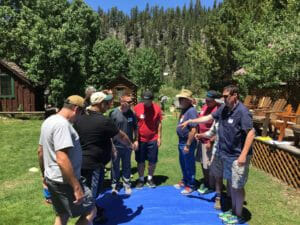 One of the things we’ve learned in our two-and-a-half decades of facilitating team building programs is how common it is for teams to jump into challenges without spending any time planning. Granted this is a human impulse, as many of us are compelled to take a “do think do” approach to problems, puzzles, and challenges.
One of the things we’ve learned in our two-and-a-half decades of facilitating team building programs is how common it is for teams to jump into challenges without spending any time planning. Granted this is a human impulse, as many of us are compelled to take a “do think do” approach to problems, puzzles, and challenges.
It’s an interesting phenomenon when it comes to work teams, though, as you wouldn’t think about allocating money to a marketing campaign or R & D project without some planning. Sure, the stakes are much lower, but teams are still driven to win or at least perform well – so why doesn’t planning come into the equation as often as you would think? (Sidenote, those teams that do take extra time to plan often fall into the high-performing category – something to aspire to!)
Due to this tendency to skip the planning stage, we’ve implemented a mandatory 15 minute planning period during the first medley challenge of our Team Performance Challenge program. During this time, teams are given the rules of their activities but are not allowed to touch any implements. So this isn’t practice time, it’s strategy time.
Then comes the interesting part, when teams are introduced to their second challenges following the first round. This is where we find out, will the team plan? And how much time will they spend planning?
Interestingly, many teams will just jump right in with no planning. There seems to be this impatience to get moving, to be “busy.” It’s as if there’s a feeling that planning is wasted time because visible progress isn’t being made. Granted, in the real world, some things require an urgency that doesn’t allow for serious strategizing – it’s usually a situational decision. However, we’ve noticed that teams almost always struggle when they don’t plan first, no matter how simple a task seems on the surface. Often it can be as simple as establishing individual roles and goals for the challenge.
Sometimes teams notice this shortcoming in planning as they move along and start to allocate more strategizing time at the beginning of an activity. Other teams don’t quite grasp this until the debriefing portion of their team building event. This is where we get a lot of forehead slapping, when teams reflect on why they performed best in the very first round.
This experience often has a lot of parallels to a group’s workplace. When teams find that they didn’t spend much time planning, they often realize this propensity at the office, finding they often jump into things without adequate foresight. Again, real-world scenarios may require different approaches. Zuckerberg made Facebook’s mantra of move fast and break things famous. However, the most important thing of all is to be aware of this choice and be intentional. Are you skipping over some of the planning steps on purpose, or out of an unconscious habit of moving fast at all cost? If it’s on purpose, then that’s great – you can evaluate your results later. If you’re not sure, then perhaps it’s time to take a breath and invest some time into planning.
Oh, and by the way, a more seasoned Zuckerberg changed his company’s motto:
“We used to have this famous mantra … and the idea here is that as developers, moving quickly is so important that we were even willing to tolerate a few bugs in order to do it,” Zuckerberg said. “What we realized over time is that it wasn’t helping us to move faster because we had to slow down to fix these bugs and it wasn’t improving our speed.“
Food for thought.
- Team Building Lessons – How Much Time Should We Spend Planning? - May 7, 2018
- Team Building Lessons – Do We Try a New Approach? - May 2, 2018
- Team Building Lessons - May 2, 2018
Interested in learning more about our team building and training options?
We'd love to talk to you!
Request Proposal



Leave a Reply